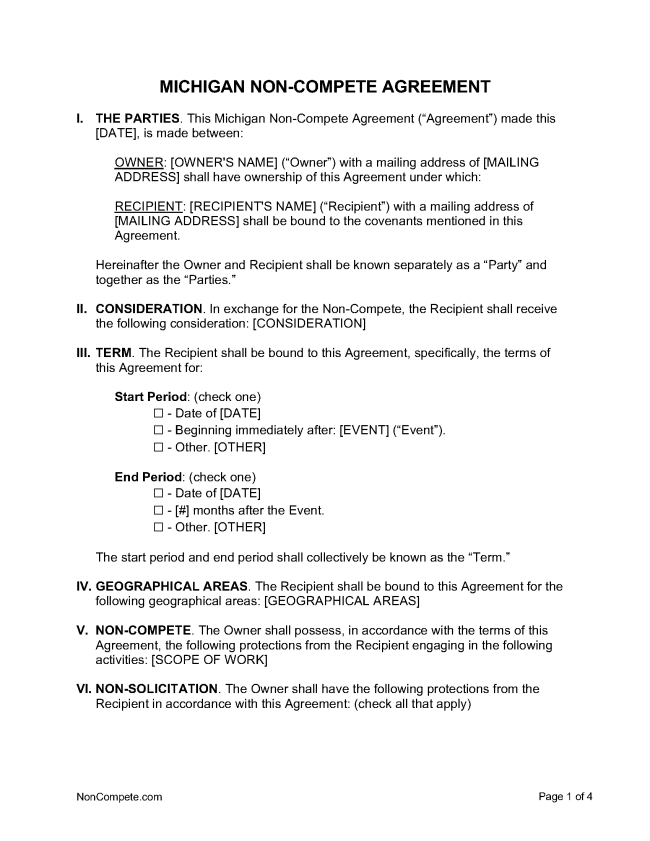A Michigan non-compete agreement is a contractual restraint that prevents a worker from pursuing some line of business. Michigan adopted a statute to govern non-competes in the 1980s, but there have been few cases interpreting it, and there are ongoing points of confusion about how the law is interpreted.
In particular, the standards for non-compete agreements in the sale of a business have been the subject of significant and ongoing litigation, and those crafting these types of agreements could benefit from the assistance of a local lawyer.
Table of Contents |
Are Non-Competes Enforceable in Michigan?
Yes, under certain circumstances.
Agreements prohibiting an employee from pursuing a particular line of work if it protects one or more reasonable competitive business interests and is reasonable concerning:
- The amount of time it covers,
- The geographic area it covers, and
- The type of work it covers.
Mich. Comp. Laws Ann. § 445.774a
Non-compete agreements associated with the sale of a business, however, are enforceable if they follow the “rule of reason.” (Innovation Ventures v. Liquid Manufacturing (2016)).
Independent Contractors
Non-compete agreements can cover both employees and independent contractors. These agreements must be:
- Pursued for a legitimate business purpose,
- Reasonable to both parties, and
- Not harmful to the public interest.
Bristol Window and Door, Inc. v. Hoogenstyn (2002).
Reasonableness
It is clear that to be enforceable, non-compete agreements associated with the sale of a business must be
- Part of a valid contract
- Pursued for a legitimate business purpose, and
- Reasonable to both parties.
However, a federal court has recently said that it is also necessary to show that the agreement does not suppress or destroy competition in the market. (Innovation Ventures, L.L.C. v. Custom Nutrition Laboratories, L.L.C. (2020)).
Protectable Interest
Protectable interests prevent an employee from gaining some unfair advantage against the employer and cannot include preventing an employee from using general knowledge or skill. This can include:
- Preventing customers from being lured away by a departed employee,
- Protecting the investment an employer makes in specialized training of an employee,
- Protecting confidential business information,
- Protecting customer lists.
St. Clair Medical, P.C. v. Borgiel (2006).
Non-Solicitation
It is unclear whether all non-solicitation clauses must be analyzed as non-compete agreements. When a non-solicitation clause only prevents an employee from reaching out to the firm’s clients and offering the same services the employee performed when working for the company, then the non-solicitation clause is a reasonable non-compete agreement and can likely be enforced. (Rooyakker & Sitz, P.L.L.C. v. Plante & Moran, P.L.L.C. (2007)).
Prohibited Professions
Non-compete agreements involving attorneys, when entered through employment contacts or partnership agreements, are generally unenforceable, except for agreements concerning retirement benefits. Rule 5.6(a), Michigan Rules of Professional Conduct.
Non-compete agreements contained in case settlements that prevent lawyers from representing a client in the future are not enforceable. Rule 5.6(b), Michigan Rules of Professional Conduct.
Terminating an Employee
Michigan courts have not explicitly ruled whether terminating an employee makes a non-compete agreement unenforceable against the employee. However, in Coates v. Bastian Brothers, Inc. (2007), the Court of Appeals of Michigan held that a non-compete agreement was enforceable against an employee who had been terminated without cause because the agreement said it would be enforceable in such circumstances.
Burden of Proof
While the party trying to enforce a non-compete agreement generally has the burden of proof initially, once the elements of a valid contract have been proven, the party claiming that there is something wrong with the contract, such as insufficient consideration, has the burden of proof. (Innovation Ventures v. Liquid Manufacturing (2016)).
Continued Employment (consideration)
Yes, continued employment is adequate consideration to support a non-compete agreement. This applies in cases of at-will employees, but if the employee is not subsequently terminated for reasons other than just cause, the agreement is not enforceable. (QIS, Inc. v. Industrial Quality Control, Inc. (2004)).
Maximum Term
There is no precise maximum term for non-compete agreements. However, the following are among the longest that have been found enforceable:
- In the context of the sale of a business, five years: Innovation Ventures, L.L.C. v. Custom Nutrition Laboratories, L.L.C. (2020)
- In other contexts, three years: Bristol Window and Door, Inc. v. Hoogenstyn (2002)
Blue Penciling (allowed)
If a portion of a non-compete agreement is unreasonable, a court may modify it to make it reasonable and enforce the altered agreement. Mich. Comp. Laws Ann. § 445.774a.
